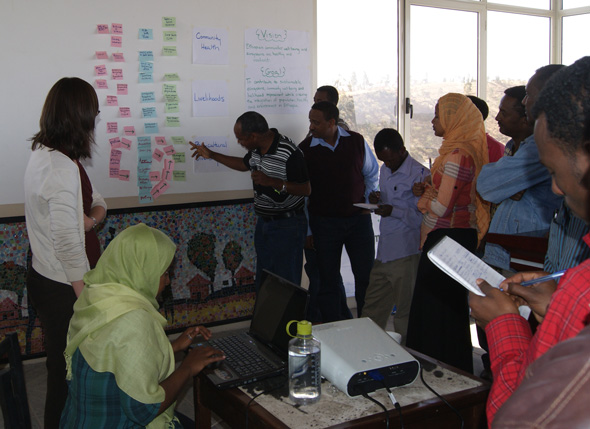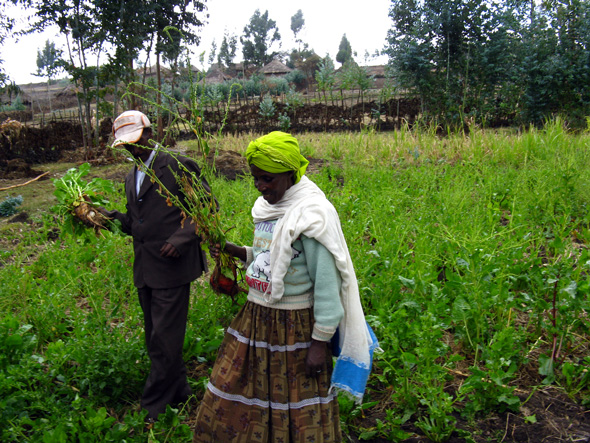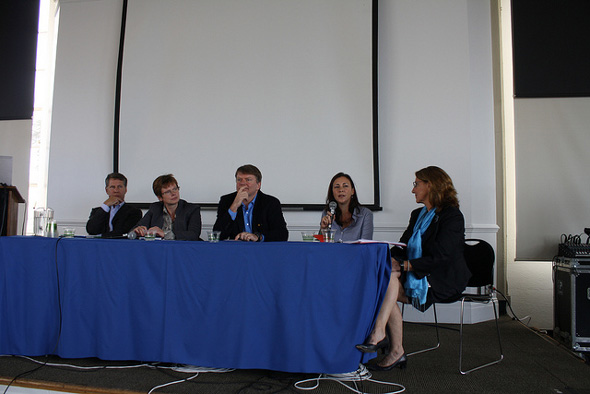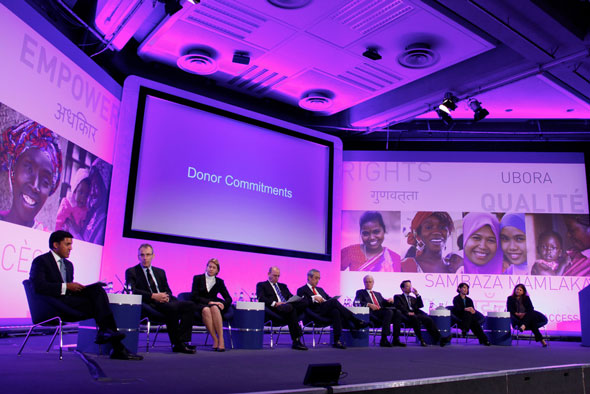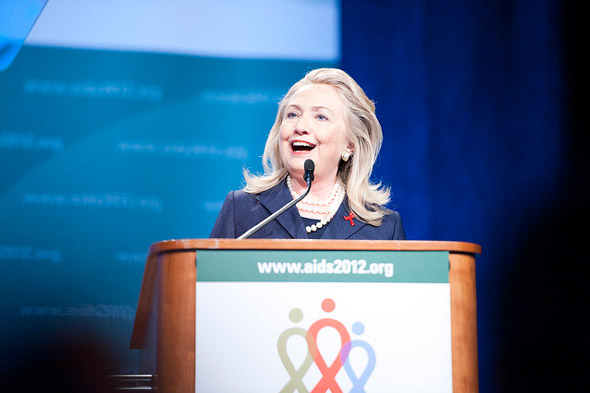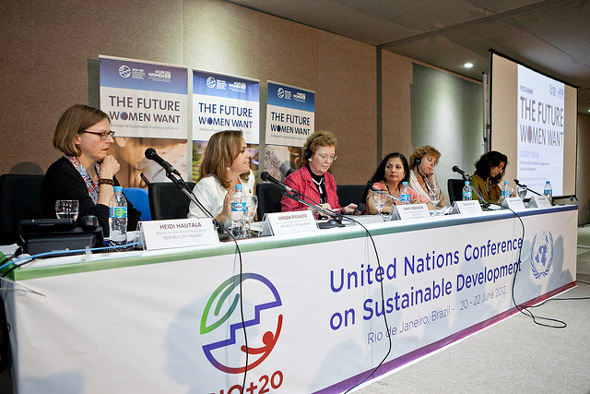-
Andrew Freedman, Climate Central
Sequestration May Degrade Weather, Climate Forecasting
›February 28, 2013 // By Wilson Center Staff
The original version of this article, by Andrew Freedman, appeared on Climate Central.
Across-the-board federal spending cuts that are scheduled to go into effect starting on March 1 are likely to cause further delays to weather and climate satellite programs, and may degrade the government’s ability to issue timely and accurate early warnings of extreme weather and climate events, according to federal officials and atmospheric scientists.
-
Five Questions for Population, Health, and Environment Projects in Ethiopia
›
Since the integrated population, health, and environment (PHE) approach is relatively new in international development, donors, partners, and implementers want to know how it’s improving people’s lives. In the PHE community, we believe that combining efforts to address natural resource management, reproductive health, and livelihoods is making a difference in places where rapid population growth combines with poverty and environment degradation. But to know for sure and be able to convince others, we need to have data to support those beliefs.
-
Stronger Evidence Base Needed to Demonstrate Added Value of PHE
›
It is well known that public health issues that affect the world’s most vulnerable populations – food insecurity, maternal and child health, water- and sanitation-related disease, and resource scarcity – are inextricably linked. Where these linkages are strongest, experience on the ground has shown that community-based integrated approaches to development provide more effective and sustainable solutions over vertical, sector-based programs. But so far, there are very few comprehensive evaluations providing strong quantitative evidence of this advantage.
-
New Support for International Family Planning: The Significance of the London Summit
›December 21, 2012 // By Carolyn LamereAt a major summit in London this summer the Bill and Melinda Gates Foundation launched one of the most significant efforts yet to revitalize commitments around the world towards providing universal access to family planning. More than 220 million women around the world – mostly in developing countries – want to delay or avoid pregnancy but are not using effective methods of contraception. Meeting the unmet needs of these women could save the lives of hundreds of thousands of mothers and millions of infants, not to mention significantly impact the future of human development. But the last decade has been a period of relative neglect by international donors.
-
Gwen Hopkins, Next Billion
Family Planning as an Investment? The Aspen Institute at the 2012 Social Capital Markets Conference
›October 16, 2012 // By Wilson Center Staff
Two weeks ago, 1,600 venture capitalists, philanthropists, and entrepreneurs gathered at the 2012 Social Capital Markets Conference (SOCAP) to discuss the question at the heart of impact investing: How can investments do well while also doing good? Consistent with the in-depth nature of SOCAP, panels examined every aspect of capital flows, including how to structure a business, how to move an idea from a prototype to scale, and where to invest for maximum impact. The resulting conversations gave rise to multiple technical suggestions – and one paradigm shift. In order to do well and do good, multiple conference participants argued, investors must incorporate a gender lens into their portfolio.
-
Maintaining the Momentum: Highlights From the 2012 London Summit on Family Planning
›
This summer, 26 countries and private donors met at the London Summit on Family Planning to pledge $2.6 billion to expand family planning services to 120 million more women in the poorest countries around the world. But while the summit renewed focus on reproductive health with its ambitious target, “we’re now at that point where we have to really sit down and work through” how to achieve that goal, said Julia Bunting of the UK’s Department for International Development at the Wilson Center on September 17. [Video Below]
-
Lawrence K. Altman, The New York Times
A World Without AIDS, Still Worlds Away
›August 6, 2012 // By Wilson Center Staff
The original version of this article, by Lawrence K. Altman, appeared on The New York Times.
Is the world on the verge of ending the AIDS epidemic and creating an AIDS-free generation, even though a cure and a vaccine are still distant hopes?Yes, roared enthusiasts among the nearly 24,000 participants at the 19th International AIDS Conference here last week. Their hopes are based on the extraordinary scientific gains made since the conference was last held in the United States, 22 years ago, when an AIDS diagnosis was a sure death sentence.
Among those gains: antiretroviral drug combinations for women to prevent infection of their newborns; drugs to treat and prevent infection with HIV, the virus that causes AIDS, among adults; and evidence that voluntary male circumcision can reduce the risk of female-to-male transmission by 50 to 60 percent.
Today, HIV has become a chronic disease that, if treated appropriately, can be held at bay in a newly infected young adult for decades — if the patient adheres to the rigid daily drug regimen.
Continue reading on The New York Times.
Lawrence K. Altman is a senior scholar for the Woodrow Wilson Center’s United States Studies Program.
Photo Credit: “Secretary of State Hilary Rodham Clinton speaks at the International AIDS Conference,” courtesy of Roxana Bravo/World Bank. -
Pop at Rio+20: Despite Failure Narrative, Progress Made at Rio on Gender, Health, Environment Links
›July 13, 2012 // By Sandeep BathalaA month ago this weekend I boarded a plane to Rio de Janeiro for the UN Conference on Sustainable Development. Over the past few weeks, I have had some time to reflect on the amazing (and exhausting) experience afforded to me. Unfortunately, the final Rio+20 outcome document (considered by some to be misnamed as “The Future We Want”) failed to recognize the connections between reproductive rights and sustainability. However, since I returned I’ve also found myself in conversations with colleagues eager to celebrate the successes of the conference.
Jason Bremner, program director at Population Reference Bureau, reminds me that the initial “zero draft document” that was circulated prior to Rio had absolutely no mention of reproductive health, family planning, or population. “Though the ultimate conference document wasn’t a success by many measures, I commend the efforts of the many advocacy organizations that resulted in the inclusion of reproductive health and family planning as a key aspect of sustainable development,” he said.
Other wins were recognized at Rio as well. On a panel organized by the International Planned Parenthood Federation, Brazilian Minister of Policies for Women Eleonora Menicucci de Oliveira pointed out that the presence of women this year was much stronger than at the 1992 conference. And she stressed that the overall importance placed on the reduction of poverty will have a big impact for women.
Though the official language was weakened in the final outcome document, there was much more support expressed at side events and off the record conversations. Speaking at the same event as Oliveira, Christian Friis Bach, Minister for Development Cooperation in Denmark, said that “one leader after another has stood up for reproductive rights, and we’ve started a campaign which will go on until ICPD+20.”
In fact, as the Wilson Center’s Brazil Institute Director Paulo Sotero points out, there was a great deal of progress made by non-government representatives alongside the main conference:I left Rio more hopeful about the future than the official part of Rio+20 would allow. As governments clearly fumbled in the face of the complex challenges of imagining and building a more equitable and sustainable economic growth model in the decades ahead, I saw senior business executives and leaders of civil society engaged in intelligent and productive dialogue about difficult issues at hundreds of thematic panels held at the Corporate Sustainability Forum and other sessions held in Rio.
I felt the same energy. And many groups there seemed to already be planning for next steps.
On the first day of side events I attended, members of the Population and Climate Change Alliance discussed strategies to ensure that in the post-2015 (i.e. post-Millennium Development Goals) international development agenda sexual and reproductive health and rights are explicitly recognized as core to sustainable development. The panel included Mialy Andriamahefazafy of Blue Ventures Madagascar, Joan Castro of PATH Foundation Philippines, Inc., and Negash Teklu of PHE Ethiopia Consortium, who all shared examples of efforts in their countries to integrate reproductive health with other sustainable development programs.Joan Castro on PATH Foundation’s work in the Philippines
The Rio+20 conference was, at the very least, a re-affirmation of the tenets set down by the ‘92 Earth Summit – that is, that there is middle ground between full-tilt economic development and uncompromising environmentalism, called “sustainable development,” and we ought to be moving towards it. It was also a fantastic gathering place for disparate groups of people to come together on to similar issues and to build momentum and networks on their issues.
For those hoping to see a stronger link recognized between reproductive rights, population, and the environment, the good news is that elsewhere, awareness and momentum seems to be growing. Just this week, The Bill and Melinda Gates Foundation joined the United Kingdom, United States, France, Germany, the Netherlands, South Korea, Norway, Sweden, and Australia to pledge more than $2.6 billion towards meeting global unmet for contraceptives. And the connection to development was explicit: “Contraceptives are one of the best investments a country can make in its future,” reads the summit website.
Coincidence to have followed so closely behind a “disappointing” Rio outcome? Perhaps not.
Sources: The Bill and Melinda Gates Foundation, Estado, UN Conference on Sustainable Development.
Photo Credit: “UN Women Leaders Forum at Rio+20,” courtesy of UN Women.
Showing posts from category funding.


